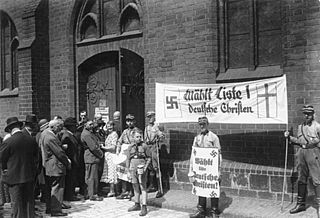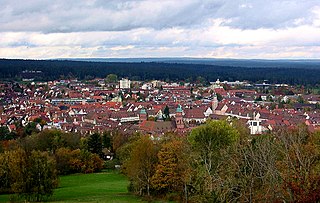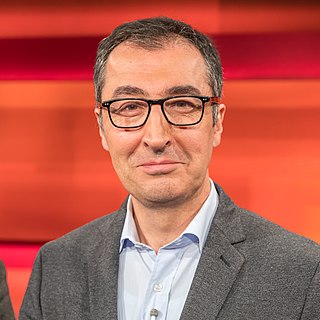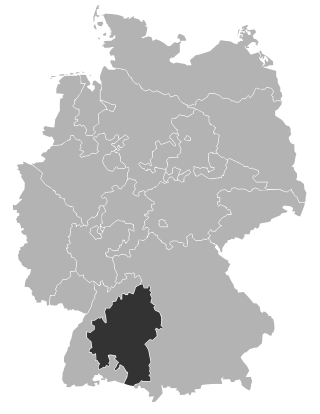
The Evangelical Church in Germany is a federation of twenty Lutheran, Reformed (Calvinist) and United Protestant regional churches and denominations in Germany, which collectively encompasses the vast majority of Protestants in that country. In 2020, the EKD had a membership of 20,236,000 members, or 24.3% of the German population. It constitutes one of the largest national Protestant bodies in the world. Church offices managing the federation are located in Hannover-Herrenhausen, Lower Saxony. Many of its members consider themselves Lutherans.

Bad Blankenburg is a spa town in the district of Saalfeld-Rudolstadt, in Thuringia, Germany. It is situated 6 km southwest of Rudolstadt, and 37 km southeast of Erfurt. It is most famous for being the location of the first kindergarten of Friedrich Wilhelm August Fröbel, in 1837.

German Christians were a pressure group and a movement within the German Evangelical Church that existed between 1932 and 1945, aligned towards the antisemitic, racist and Führerprinzip ideological principles of Nazism with the goal to align German Protestantism as a whole towards those principles. Their advocacy of these principles led to a schism within 23 of the initially 28 regional church bodies (Landeskirchen) in Germany and the attendant foundation of the opposing Confessing Church in 1934. Theologians Karl Barth and Dietrich Bonhoeffer drafted the Barmen Declaration the same year opposing Nazi doctrines.

The German Evangelical Church was a successor to the German Evangelical Church Confederation from 1933 until 1945.

Freudenstadt is a town in Baden-Württemberg in southern Germany. It is capital of the district Freudenstadt. The closest population centres are Offenburg to the west and Tübingen to the east.

Cem Özdemir is a German politician who currently serves as Federal Minister of Food and Agriculture since 2021. He is a member of the Alliance 90/The Greens party.

Christianity is the largest religion in Germany. It was introduced to the area of modern Germany by 300 AD, while parts of that area belonged to the Roman Empire, and later, when Franks and other Germanic tribes converted to Christianity from the fifth century onwards. The area became fully Christianized by the time of Charlemagne in the eighth and ninth century. After the Reformation started by Martin Luther in the early 16th century, many people left the Catholic Church and became Protestant, mainly Lutheran and Calvinist. In the 17th and 18th centuries, German cities also became hubs of heretical and sometimes anti-religious freethinking, challenging the influence of religion and contributing to the spread of secular thinking about morality across Germany and Europe.

The Prussian Union of Churches was a major Protestant church body which emerged in 1817 from a series of decrees by Frederick William III of Prussia that united both Lutheran and Reformed denominations in Prussia. Although not the first of its kind, the Prussian Union was the first to occur in a major German state.
The Evangelical Church Conference was a convention of delegates from the different Protestant denominations in Germany and Austria.

Eugen Karl Albrecht Gerstenmaier was a German Evangelical theologian, resistance fighter in the Third Reich, and a CDU politician. From 1954 to 1969, he served as President of the Bundestag. With a tenure of over 14 years, he is, as yet, the longest serving presiding officer of the German parliament and also the only person to preside over the Bundestag during four legislative periods.

Christianity is the largest religion in Luxembourg, with significant minorities of non-religious people and adherents of other faiths.

Volker Kauder is a German lawyer and politician of the Christian Democratic Union (CDU). He served as parliamentary group leader of the ruling CDU/CSU faction in the German Bundestag from 2005 to 2018, during which he was frequently referred to as the "right hand" of Chancellor Angela Merkel.

The German Evangelical Church Assembly is an assembly of lay members of the Evangelical Church in Germany, that organises biennial events of faith, culture and political discussion.

Protestant Church in the Rhineland is a United Protestant church body in parts of the German states of North Rhine-Westphalia, Rhineland-Palatinate, Saarland and Hesse (Wetzlar). This is actually the area covered by the former Prussian Rhine Province until 1920.
Lutheran viewpoints concerning homosexuality are diverse because there is no one worldwide body which represents all Lutherans. The Lutheran World Federation, a worldwide 'communion of churches' and the largest global body of Lutherans, contains member churches on both sides of the issue. However, other Lutherans, including the Confessional Evangelical Lutheran Conference and International Lutheran Council, completely reject homosexuality.

The Institute for the Study and Elimination of Jewish Influence on German Church Life was a cross-church establishment by eleven German Protestant churches in Nazi Germany, founded at the instigation of the German Christian movement. It was set up in Eisenach under Siegfried Leffler and Walter Grundmann. Georg Bertram, professor of New Testament at the University of Giessen, who led the Institute from 1943 until the Institute's dissolution in May 1945, wrote about its goals in March 1944: "'This war is Jewry's war against Europe.' This sentence contains a truth which is again and again confirmed by the research of the Institute. This research work is not only adjusted to the frontal attack, but also to the strengthening of the inner front for attack and defence against all the covert Jewry and Jewish being, which has oozed into the Occidental Culture in the course of centuries, ... thus the Institute, in addition to the study and elimination of the Jewish influence, also has the positive task of understanding the own Christian German being and the organisation of a pious German life based on this knowledge."

The Evangelical-Lutheran Church in Württemberg is a Lutheran member church of the Evangelical Church in Germany in the German former state of Württemberg, now part of the state of Baden-Württemberg.

Christian Gottlob Barth was a German Protestant minister, writer and publisher. He founded the publishing house Calwer Verlag in 1833. A representative of pietism in Württemberg, he is regarded as one of the fathers of the Christian revival (Erweckungsbewegung) there in the 19th century. He is also remembered for his children's Bible, translated as "Bible Stories", and then into many languages.
The German Evangelical Church Confederation was a formal federation of 28 regional Protestant churches (Landeskirchen) of Lutheran, Reformed or United Protestant administration or confession. It existed during the Weimar Republic from 1922 until replaced by the German Evangelical Church in 1933. It was a predecessor body to the Evangelical Church in Germany.
An evangelical academy is a Protestant Christian conference center in Germany which bridges church and world by offering thematic, open discussions on contemporary social, economic, political and scientific questions.

















